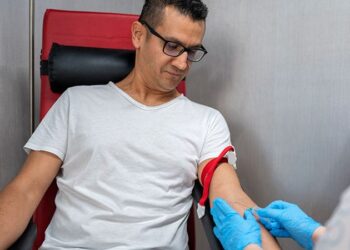CHICAGO — In patients with type 2 diabetes who have established atherosclerotic cardiovascular disease, chronic kidney disease, or both, the oral formulation of semaglutide, a glucagon-like peptide (GLP-1) receptor agonist, reduces the risk for major adverse cardiovascular events, according to SOUL, an international phase 3b placebo-controlled trial.
The result is “consistent with prior studies of injectable semaglutide and other GLP-1 receptor antagonists,” but a positive result is still a big deal, said principal investigator Darren K. McGuire, MD, who is distinguished chair in cardiovascular science at the University of Texas Southwestern Medical Center in Dallas.
“I am going to guess that over half of people who are eligible will refuse a GLP-1 receptor antagonist just because they don’t want to take an injection,” which was the only evidence-based option before this trial was completed, he said during a late-breaker session at the American College of Cardiology (ACC) Scientific Session 2025. The results were simultaneously published in the New England Journal of Medicine.
Proof of benefit with an oral agent “is going to answer an unmet clinical need,” he said.
The Double-Blind Soul Trial
The double-blind SOUL trial assessed 9650 patients 50 years or older with type 2 diabetes and coronary artery disease, cerebrovascular disease, symptomatic peripheral artery disease, or chronic kidney disease, defined as an estimated glomerular filtration rate (eGFR) < 60 mL/min/1.73 m2.
The primary endpoint was a 3-point major cardiovascular events outcome of CV death, nonfatal myocardial infarction, or nonfatal stroke. If superiority was shown, the study design allowed for the exploration of a confirmatory secondary endpoint of a 5-point composite outcome related to kidney events. If a kidney benefit was confirmed, superiority could be evaluated for CV death as an isolated endpoint.
With a 14% relative reduction in the primary 3-point composite endpoint after a mean follow-up of 49.5 months, the hazard ratio easily met statistical significance (HR, 0.86; P = .006). This robust outcome was consistent across subgroups, and provided the premise for calling the benefit of oral semaglutide evidence-based, McGuire explained.
However, protection against the secondary 5-point composite endpoint of kidney events, such as severe kidney compromise (eGFR < 15 mL/min/1.73 m2), missed statistical significance (HR, 0.91; P = .0967).
Kidney protection has been anticipated since the 2024 FLOW trial, in which subcutaneous semaglutide led to a 24% reduction in a composite outcome that included kidney disease events and death from either CV or kidney-related causes (HR, 0.76; P = .0003).
Kidney Protection Misses Statistical Significance
In SOUL, the numerical reduction in kidney disease events and the reduction in CV death, although not significant (odds ratio, 0.93; 95% CI, 0.52 – 1.09), “were directionally consistent” with the primary outcome and with FLOW, McGuire reported. One potential explanation for the difference between SOUL and FLOW was the greater mean baseline renal function in SOUL than in FLOW (eGFR 73.8 vs 47.9 mL/min/1.73 m2) and the lower rate of adverse kidney events.
Other secondary outcomes in SOUL, such as nonfatal stroke (HR, 0.88; 95% CI, 0.70 – 1.11) and major adverse limb events (HR, 0.71; 95% CI, 0.52 – 0.96), also favored semaglutide, either numerically or statistically.
In SOUL, about 25% of randomized patients were also taking a sodium-glucose cotransporter-2 (SGLT2) inhibitor; this group was evaluated separately in a substudy, also simultaneously published with the main results. The substudy showed that the reduction in the primary endpoint with oral semaglutide was essentially the same, whether or not patients were taking an SGLT2 inhibitor.
“An analysis of major adverse cardiovascular events by any in-trial use of SGLT2 inhibitor use versus no use also showed no evidence of heterogeneity in the effects of oral semaglutide,” McGuire said.
GLP-1 Antagonist Effect Is Independent of SGLT2 Inhibitor Use
This latter point is important “for those of us who may have had some reluctance in coprescribing these medications,” said Anuradha Lala, MD, an associate professor of cardiovascular medicine at the Icahn School of Medicine at Mount Sinai in New York City, who was the ACC-invited discussant for the session.
The value of this study is that it provides an evidence basis for prescribing oral semaglutide in patients with type 2 diabetes and concomitant CV disease, she explained.
“We now have expanded options, which is a “thrilling” development, but, she added, the results “beg the question of where the oral agent fits in our armamentarium.” She asked McGuire whether he thinks the different semaglutide formulations are interchangeable or if he would still start with an injectable, reserving oral therapies for those who refuse an injectable.
“I say unequivocally that if they would take the injection and they have access to it, then that is preferred. It is 100% bioavailable if you inject it,” McGuire said; bioavailability of the oral formulation is much lower.
However, the reality is that many people refuse semaglutide injections, even when 32-G or 35-G needles are used, he acknowledged.
“It’s not that they hurt very much. You simply cannot feel it going into the skin,” he said. Many patients would likely be willing to take these injections if they could try them once, he added.
“As much as we don’t like to talk about it, there are a lot of patients and a lot of prescribers who are still hesitant,” said McGuire. This means a large proportion of patients are not receiving therapy on the basis of “fear of the needle.”
McGuire has reported financial relationships with Altimmune, Alveus, Amgen, Applied Therapeutics, AstraZeneca, Bayer, Boehringer Ingelheim, CSL Behring, Esperion, Intercept, Kailera, Lexicon, Lilly, Metsera, Neurotronics, New Amsterdam, Pfizer, and Ventyx. Lala has reported financial relationships with Abiomed, Cytokinetics, Novartis, and Zoll.
Source link : https://www.medscape.com/viewarticle/oral-glp-1-receptor-antagonist-reduces-cv-risk-2025a10007kr?src=rss
Author :
Publish date : 2025-03-30 17:30:00
Copyright for syndicated content belongs to the linked Source.














